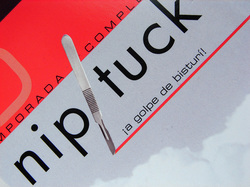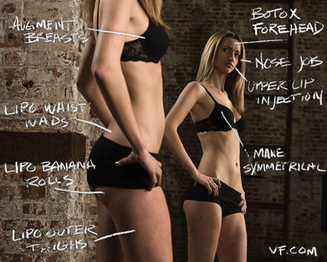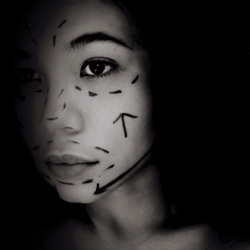Body Image: What Effect the Media Has On People
Plastic Surgery and the Media
Kristin Johnson
"I don't need plastic in my body to validate me as a woman."
-Courtney Love
-Courtney Love
The Media
The media has had so much of an impact on our society that plastic surgery is no longer a rare and obscure condition. “The media communicates its messages through images which tyrannize our fleshy, flawed, embodied, realities. No matter how much we try to control or diet or deodorize our bodies, we cannot hope to match the illusion on the screen or the printed page” (Hutchinson 64). Our culture does, in fact, obsess over this idea of a perfect body image. Many women feel alone in their battle in becoming synthetically beautiful. “In fact, it is a rare woman today who has a healthy body image, who is not actively doing battle with her body” (Hutchinson 15). In every direction we look, we see these perfect figures of women in our media. Every woman can agree that at that first glance of radiant beauty, she suddenly feels overpowered. Such dominance and intimidation can lead women to feeling dissatisfied with their bodies. The low self-esteem, originally acquired from the fake and technologically enhanced woman, has now caused this woman to take extreme measures in order to resemble the perfect body image.
The most surprising issue of the media influence is the fact that this is considered unattainable beauty. Unattainable beauty is found when we compare ourselves to a computer-generated model. In fact, “researchers generating a computer model of a woman with Barbie-doll proportions, for example, found that her back would be too weak to support the weight of her upper body, and her body would be too narrow to contain more than half a liver and a few centimeters of bowel. A real woman built that way would suffer from chronic diarrhea and eventually die from malnutrition” (Greenwald, Merchant, and Savaiano). It is sickening and shocking to think that our media has pushed us this far.
The most surprising issue of the media influence is the fact that this is considered unattainable beauty. Unattainable beauty is found when we compare ourselves to a computer-generated model. In fact, “researchers generating a computer model of a woman with Barbie-doll proportions, for example, found that her back would be too weak to support the weight of her upper body, and her body would be too narrow to contain more than half a liver and a few centimeters of bowel. A real woman built that way would suffer from chronic diarrhea and eventually die from malnutrition” (Greenwald, Merchant, and Savaiano). It is sickening and shocking to think that our media has pushed us this far.
Benefits and Risks of Cosmetic Surgery
Pros
Clearly, the most obvious benefit of plastic surgery is improved appearance, improved self-confidence and better body image. However; there are no sure-fire ways to guarantee that you’ll get the results you really want. Depending on the procedure you’re considering, cosmetic surgeries are sometimes invasive and painful, and recovery time can range from one day to six months. Final results may not even be evident for as long as one year. Make sure you’re informed about the procedure, the degree of pain involved, recovery times, the cost of plastic surgery, and the total time it will take to see the long-term results.
Cons
Above all, it is important to know all of the dangers involved before making a final decision. While the procedures are “cosmetic” in nature, cosmetic plastic surgery is still real, surgery. Talk to your doctor. Be sure that you are fully informed about the risks involved. The bottom line is that plastic surgery, no matter how minor, is still a medical procedure that can affect your physical well-being and health. While physical beauty is something we all appreciate and strive for, sometimes surgery isn’t the answer. Making a well informed decision with the help of a qualified surgeon can be one of the best ways to ensure that you get the most from your chosen procedure.
Plastic Surgery as Demonstrated on TV

The media has basically given us the consent to go get plastic surgery when need be. Many shows like “I want a Famous Face,” “Nip/Tuck,” and “Extreme Makeover” show only the few positive aspects about plastic surgery. These mainstream reality shows are forgetting one small detail about plastic surgery… the risk. Every surgery performed has a list of complications to go along with it. “Others say the shows imply that plastic surgery is without risk. In fact, liposuction is one of the riskiest cosmetic procedures available, and liposuction combined with a tummy tuck is even more dangerous. According to a study by the American Society of Aesthetic Plastic Surgery, the risk of death from liposuction is one fatality per 47,415 procedures, but the rate increases to once every 3,281 procedures when liposuction is combined with abdominoplasty” (Friedman 324). The shows normalize cosmetic surgery and throw well-presented information at the audience. The statistics on how normal plastic surgery has become is sickening, “plastic surgery has become a $5-billion-a-year industry and is increasingly considered part of the natural order of things for women” (Hesse-Beiber 51). Plastic surgery is no longer an option but a demand made by many people. But do they really know the risk involved in going under the knife? “Several widely publicized deaths from cosmetic surgery have added to the concerns. For instance, eight patients between 2002 and 2004 undergoing surgery in private offices in Florida later died; four of them were having liposuction and a tummy tuck at the same time. And two women died last year as a result of surgery at a prestigious New York hospital” (Tackla). Death because of surgery is often heard of, but after viewing the makeover television shows you would believe that plastic surgery is completely safe and reliable. Many regulations and laws have been passed since the many deaths involved with cosmetic surgery. Unfortunately, these laws and regulations have not slowed down our society in having plastic surgery performed. The future of plastic surgery is actually pretty terrifying.
Solutions
So what is the solution to our society’s obsessive problem? Susie Orbach presented one of the greatest solutions in her article “Fat is an Advertising Issue.” She worked on the Dove Campaign for Real Beauty and in this campaign it featured normal women of different shapes and sizes. This entire campaign presented a whole new idea in advertising. Bringing women’s insecurities into the media stirs up many emotions. Especially in the current situation where it is a competition to see who can be thin, thinner, and ultimately the thinnest. The Dove Campaign for Real Beauty was something we have never seen before and it can help restore women’s self-esteem. Many competitor companies are now stepping in because Dove’s campaign was so successful. “The poignancy of these little (and big) girls showing their dissatisfactions and their wish to be free of some of the most quintessentially adorable aspects of themselves was completely compelling” (Orbach page #). Every person was made completely different. It is out of our control to determine what perfection in beauty is. “Scientists are discovering the individuality of every body. There is no one right way to eat; no one right way to exercise, and no one right weight. Each and every body is unique in its requirements. Some very interesting research suggested that every body has a weight range, a setpoint that is right for it. That setpoint knows nothing about what is currently in vogue. It is a stubborn and determined little mechanism with only one function, to maintain weight in the range that it considers correct” (Hutchinson 29). [R1] You see, there can be truth in advertising. It was a huge accomplishment to see a brand-name company step up and admit that there is something wrong with our society’s media in advertising. It will be interesting to see where our truth in advertising goes from here since Dove’s campaign was extremely successful.
The media feeds us with the mentality that we must look like that woman or man in order to be beautiful. Cosmetic surgery will continue to be a solution to dealing with low self-esteem and obsession with body image as an effect of what the media has caused. The synthetic ideals of the model industry and advertising age all encourage our society to change their appearance. Many individuals and groups have stepped in to change the way our media influences such risky business. Cosmetic surgery probably will never disappear, but with the new bans and laws in certain states, it is definitely helping the matter. We can count on the rising truth in advertising that has begun just a few years ago. Unattainable beauty and our culture’s obsession with thinness have deeply scarred our society. Years ago, plastic surgery was unheard of and frowned upon. It is sad that we have come this far in medical technologically and we have this many more deaths related to plastic surgery. Is it something that can be changed? Only time can tell. As for now, body image will continue to be a problem in our society and we can thank the media for putting lives on the line.
The media feeds us with the mentality that we must look like that woman or man in order to be beautiful. Cosmetic surgery will continue to be a solution to dealing with low self-esteem and obsession with body image as an effect of what the media has caused. The synthetic ideals of the model industry and advertising age all encourage our society to change their appearance. Many individuals and groups have stepped in to change the way our media influences such risky business. Cosmetic surgery probably will never disappear, but with the new bans and laws in certain states, it is definitely helping the matter. We can count on the rising truth in advertising that has begun just a few years ago. Unattainable beauty and our culture’s obsession with thinness have deeply scarred our society. Years ago, plastic surgery was unheard of and frowned upon. It is sad that we have come this far in medical technologically and we have this many more deaths related to plastic surgery. Is it something that can be changed? Only time can tell. As for now, body image will continue to be a problem in our society and we can thank the media for putting lives on the line.


